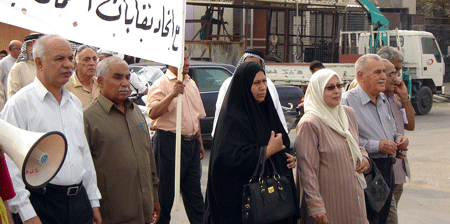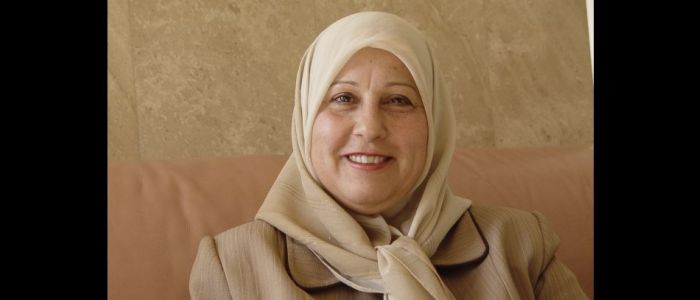“Iraqi workers need a fair and just labour law”
Brussels, 9 February 2010: In Iraq, Saddam Hussein’s unjust anti-union laws continue to be enforced. Hashmeya Musshin al-Saadawi is president of the Electricity Workers and Employees Union in Basra, vice president of the General Federation of Iraqi Workers in Basra, and member of the Executive Committee of the ICEM representative of Women’s Affairs for the Middle East and North Africa. She calls for international union solidarity to support the national labour campaign to get a new, fair and just labour law for Iraqi workers (1).
You are a member of the National Labour Campaign launched in November 2009. Could you explain to us what the main objective of this campaign is?
The main objective of the National Labour campaign is to mobilise all national forces, political figures and civil society organisations and union supporters so as to put pressure on the Iraqi government and parliament to pass a just and fair labour law that replaces Saddam’s Hussein unjust anti-union laws which continue to be enforced today.
-What have been the first results of this campaign?
Since the launch of the Labour Law campaign in Baghdad on 8 November 2009 at a press conference, the National Labour Committee has organised many activities ranging from launching a second national conference on 11 November 2009 in Eribl/Iraqi Kurdistan. This was followed by a visit to and meeting with the President of Iraq MR Jalal Talabani, who signed the campaign’s appeal and [donated 50 million Iraqi dinars to the campaign].
The national labour committee organised a third national press conference in Basra. This press conference was attended by a number of civil society organisations and trade unions, journalists and national figures and political parties. The press conference turned into a forum of debate afterward. Participants expressed their support and solidarity with the campaign.
The campaign has secured the support of 80 MPs [out of 82].
The total number of people who signed the appeal stands at 1100 in Basra. Many local and national papers reported the activities of the campaign.
The president of the GFIW in Basra, Brother Hussein Fadel Hassan, and I visited the Basra Governorate council member and chairman of the Human Rights Commission, and he began by praising the GFIW in Basra for its defense of workers rights and its struggle to lift injustice committed against workers, but he refused to sign the appeal even though we had a long discussion with him. However, he signed the social security campaign launched by the Electricity Workers Union.
We also made a visit to the first deputy Governor of Basra to seek his support for the campaign, but he passed on the appeal to his political adviser for considerations, but it was all pretence so as to avoid signing the appeal.
The vice-president of the Electricity Workers and Employees Union in Basra, Brother Salih Abdulkhader, and I visited a member of the National Security and Defense Committee of the Iraqi Parliament . The chairman of the Electricity Commission, who is also a member of the Basra Governorate Council, attended the meeting as well. The MP refused to sign the appeal saying this could be used as election propaganda. But the chairman of the Electricity Commission expressed solidarity with campaign and asked for copies of the appeal. We have organised a meeting with the chairman of the Electricity Commission next week.
We shall carry on with the task of rallying workers for a just and fair labour law, and we shall not hesitate to take action that could help the success of this just national cause.

For this campaign, what kind of international trade union support are you asking for?
The national labour campaign was launched with support of the International Trade Union Confederation [the ITUC]. We are hopeful that the ITUC will strengthen its solidarity support by encouraging its national trade union affiliates to support the campaign and especially in countries where Iraq has diplomatic ties [embassies or diplomatic missions]. The ITUC could designate a day when delegations from national trade union centres may visit the Iraqi embassies to show support and solidarity with our national labour campaign. In my opinion, international solidarity matters in such a campaign will pressure the Iraqi government to legislate a new, fair and just labour law.
The national election will take place in Iraq on 7 March. In the perspective of this National Labour Campaign, what is at stake in the national election?
We aspire and hope the outcome of election will bring a change for the better to Iraq and its people. But aspiration is one thing and reality on the ground is something else. The Election Law which was passed on the behest of key dominant political blocks excludes many Iraqis from a fair share of parliamentary representation. The second point is the disappointment experienced by a large number of Iraqi voters due to vote rigging and a lack of improvement of basic services promised by current governing parties. The 7 March national election may witness voter apathy. Sorry, it is not pessimism, but this is how I see it.
As denounced by the ITUC, on 29 November your trade unionist colleague Majeed Sahib Karrem, the last one of a long list of trade unionists killed, was murdered in a bomb attack from under his car. How do you manage to deal daily with this violence against trade unionists?
With regard to the security aspect and the losing of so many Iraqi trade unionists at the hands of terrorists and gangs of criminals, the situation is tragic. Their martyrdom will strengthen our determination and resolve to continue with the task of defending working people. These terrorists are targeting not only trade unionists, but they are also targeting the very basic principles in the development of a progressive and democratic Iraq. We
cannot stand aside, despite the risks.
In your sector, the electricity sector, what are the main problems the workers are facing?
Before I talk about the electricity sector and its problems, I would like to talk about Basra. This province is the lifeblood of Iraq’s economic prosperity. Its oil production stands at more than 65% of the national oil production. It is Iraq’s only seaport. It had so many industrial factories stopped due to neglect and wars in the past and further neglect by successive post-2003 governments. It is the economic capital of Iraq. It is a city of culture and arts. It is the cultural capital of Iraq. The city of Basra has a long traditional history of trade unionism. Its recent history is full of trade union heroes who stood against Saddam Hussein’s regime and as a result were murdered. And today the city has trade union representation in all sectors of Basra’s industries.
The electricity sector in Basra is made up of three departments (production, transport, and distribution). The production plants in Basra are Hartha thermal plant, Khor Al-Zubair gas plants ( two new plants) and Najibiyah thermal plant and Shuaiba gas plant. These plants are old except Khor Al Zubair, which was installed three years.
The problems my union has to deal with are many, but mostly the lack of fair and just trade union legislation. We are campaigning with the rest of Iraqi workers for a fair and just labour law. Public sector workers are prohibited to join unions under Decree 150 of 1987. Unfortunately, this Decree is still being used as a stick against us by government officials, but conveniently government officials tend to forget Article 22 of the Iraqi Constitution, which guarantees workers the right to form trade unions.
Occupational health and safety at work is poor. There are not sufficient health and safety training or educational workshops or training. Workers lack safety equipment and procedural measures. As a result of this neglect, many workers have suffered injuries and some even disabilities. Administrative and financial corruption are rampant in all sectors of the energy industry. This is a major cause of why this industry is still lacking re-development and advancement. The return of many corrupt Baathists to high positions of responsibility (administratively and financially) after they have conveniently joined the dominant political parties has made things worse.
How is your union trying to answer concretely the concerns of these workers in your region, Basra?
There are few head departments within the electricity sector who are trying to forfeit workers rights by stopping paying them overtime they did or by not paying allowances due to geographical location. For months [my union] negotiated with these departments over these issues but with no positive outcome.
We (my union) organised an hour sit-in outside the headquarters of the Directorate of the Transfer of Energy. The Office of the Inspector General and a member of the Basra Governorate Council/ President Electricity Commission intervened by saying he supported our demands. I subsequently telephoned the national transport adviser at the Ministry of Electricity and argued that workers have the rights to their claims. Workers rights were restored and corrupt officials and administrations were exposed.
My union in Basra organised workshops on health and safety at the workplace and have invited specialists in this field to do the training.
In an interview given to the ITUC in November 2007, you warned it was becoming more and more risky for Iraqi women to work. How has this situation evolved?
The security situation in 2007 and the preceding years were very bad, and women were a prime target, especially by militias and gangs. However, the security situation now after the military operation Charge of the Knights launched by the government in 2008 has stabilised and improved the security situation significantly for all.
Inside the Iraqi trade union organisations, how is the situation regarding places for women trade unionists evolving?
Unfortunately the status of women in trade unions remains weak. In my opinion this is due to the following: lack of confidence, fear and hesitation.
How is the relationship between the different parts of the Iraqi & Iraqi Kurdistan trade union movements evolving?
We have good and fraternal relations with trade unions in the region of Kurdistan/Iraq and have worked together in many joint workshops in Iraqi Kurdistan.
As you know, the national labour committee campaign has two fellow members of the Kurdish trade union federations. They are a key force in this campaign as was demonstrated in the Erbil committee press conference and the role they played in securing the meeting with the President of the Republic of Iraq, Mr Jalal Talabani.
Interview by Abdullah Muhsin & Natacha David


